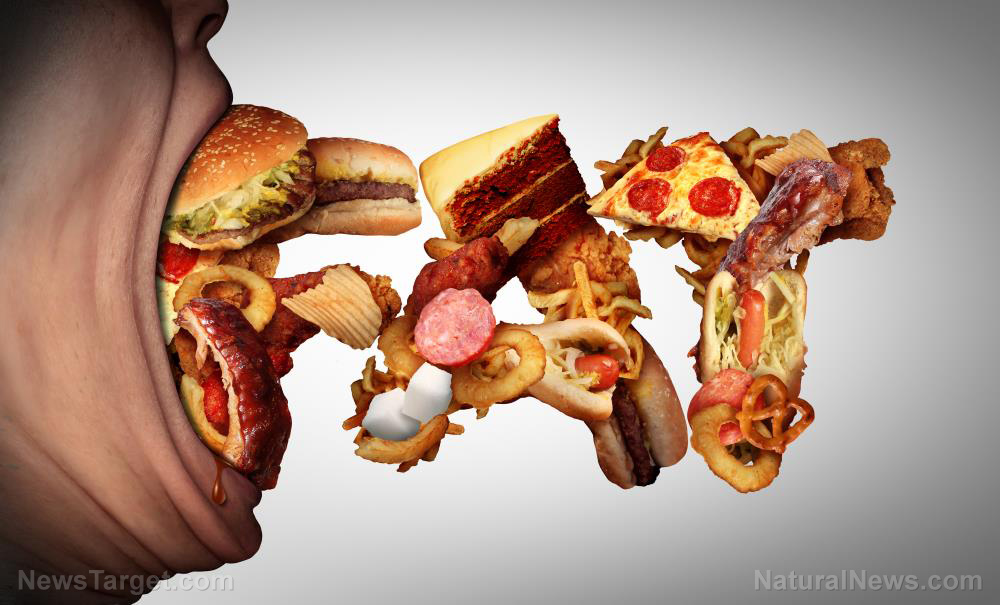Diets rich in fats not only affect your physical appearance — they also affect your brain
07/27/2020 / By Virgilio Marin

A study published in the journal Cell Metabolism found that a high-fat diet can affect the brain by promoting inflammation in the hypothalamus — the part of the brain responsible for regulating appetite and metabolism.
To date, only a few studies have linked an unhealthy diet to neurological irregularities. But in their study, researchers at Yale University School of Medicine established a link between the two and highlighted the importance of a healthy diet.
“There are specific brain mechanisms that get activated when we expose ourselves to specific types of foods,” said Sabrina Diano, the senior author of the study. “This is a mechanism that may be important from an evolutionary point of view. However, when food rich in fat and carbs is constantly available, it is detrimental.”
A diet rich in fats causes you to eat more
According to the researchers, inflammation occurs in the hypothalamus as early as three days after eating only fatty foods. This can happen even before the effects of a high-fat diet on body weight become noticeable.
The rapid changes inside the body triggered by the consumption of fatty foods intrigued the researchers, so they decided to identify the cellular mechanisms behind these events.
For their experiment, the researchers fed a group of mice a high-fat diet then looked at the intracellular events that lead to inflammation in the hypothalamus. They found that a high-fat diet triggers the overexpression of uncoupling protein 2 (UCP2), a mitochondrial protein that helps regulate the production of cellular energy.
The over-expression of UCP2 causes the mitochondria of microglia — immune cells found in the central nervous system — to shrink in size, resulting in their activation. Once activated, microglia release signaling molecules that promote inflammation in the brain.
The researchers observed that when hypothalamic neurons were exposed to inflammatory signals from microglia, they caused the mice to eat more and become obese. But when the researchers deleted UCP2 from microglial cells, the mice became immune to the effects of a high-fat diet.
The animals showed no signs of hypothalamic inflammation, ate less and became resistant to weight gain. They also showed increased energy expenditure.
Based on these findings, the researchers concluded that the detrimental effects of a high-fat diet are mediated by UCP2, whose over-expression is required for microglia activation, hypothalamic inflammation and obesity.
Good fats vs. bad fats
Fats get a bad rap because of their association with many diseases. However, not all fats are bad for your health.
According to the latest studies, fat consumption doesn’t always cause diet-related diseases. Findings from the Nurses’ Health Study and the Health Professionals Follow-up Study suggest that the overall percentage of calories that come from dietary fat does not contribute to cancer, heart disease and weight gain.
Instead of avoiding fats, health experts now recommend choosing the right fats to add to your diet. Healthy fats that benefit the body in numerous ways are known as monounsaturated and polyunsaturated fats. Nuts, seeds, fish and olive oil contain high amounts of these health-promoting fats. (Related: Healthy high-fat diet protects the brain from aging.)
On other hand, trans fats are harmful to the body and can increase the risk of serious diseases. Processed foods are rich in trans fats, since they are made using partially hydrogenated oils. Saturated fats are also considered harmful to health because they raise bad cholesterol levels. Red meat, butter, cheese and ice cream are some examples of foods rich in saturated fats.
Having a well-balanced diet is important for maintaining good health. A poor diet not only leads to health problems, it also alters your neurological circuits in favor of overeating. To avoid this, ditch processed and fatty foods for nutritious plant-based foods, such as fruits, vegetables, nuts, seeds and whole grains.
JunkFood.news has more on foods you should avoid and why they’re bad for your health.
Sources include:
Tagged Under: #nutrition, bad fats, brain health, fast food, fight obesity, healthy fats, high-fat diet, hypothalamus, inflammation, microglia, mitochondria, nutrients, overeating, research, weight gain
RECENT NEWS & ARTICLES
COPYRIGHT © 2017 FOOD SCIENCE NEWS



















